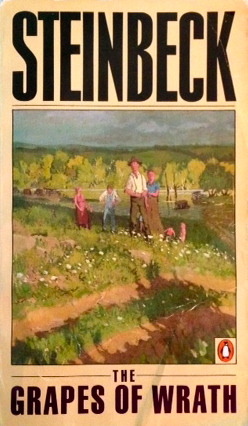
The writing style of this novel is third person. It often separates the chapters of
the main story line (following the Joad family) with chapters describing the overall
climate of the era, the region, and the people as a whole (The novel takes place
during the American dust-bowl in the wake of the great depression and opens with
farming/sharecropping families in Oklahoma), often drawing parallels and
foreshadowing to the main story line in order to show that the Joads may have a
terrible deal and a real struggle to bear but they aren't the exception, they're
the rule.
If you ever feel like your life couldn't be worse, Steinbeck paints a believable
picture of how the Joads' lives are probably worse than yours in every way, and
they were only regular Americans who never made a mistake and even had great luck
in some cases and quite the laundry list of skills under their belt. I think
Steinbeck wants us to ask ourselves throughout this novel: "how many of us could
have faired as well as the Joads in the same situation?" and maybe even "How can we
ensure that the scenarios described in this book never plague thousands of American
families ever again?". This Book is a depressing story of an agricultural family
who are brilliant at living off the land and between them have just about every
skill you could ever need for farming, sharecropping, construction, auto mechanics,
cooking/preserving food. Unfortunately for them the world they live in isn't
concerned with raw ability, it's concerned with one thing; profitability. After the
bank pushes the entire family off the land they had worked for generations in favor
of a single tractor and it's driver; the family, along with just about every other
Midwestern agricultural family, makes their way west to California after receiving
a hand bill promising hundreds of jobs picking fruit. The family buys a truck and
packs up what little they can fit and shoves off to California but soon realizes
the handbills were thought up by the landowners to create a surplus of workers that
will all fight over the smallest sum in order to feed their starving families.
The Novel is a portrait of the failings of Capitalism to provide for the majority of
it's citizens as population increases, land is pooled, technology improves, and
specialization increases. The characters have to struggle between understanding
that the many could organize to regain the power that's been stolen from them and
the reality that they can't sustain an uprising for long with so little food to
their names and nowhere to lay their heads. This novel is a great example of
American Socialist perspective in the twentieth century. It paints an all too
relatable tale of the lengths land owners will go to to keep their workers
subservient, grateful, and out of luck. It shows the altruistic generosity of those
who are down and out in contrast with the greed of those with plenty. It shows the
persistent spirit of man in the most hopeless of prospects and the strength of the
bond between men in dire straits. If you're an American and somehow still a
capitalist, this book may just convert you. Even if it doesn't turn you into a
Socialist this is still a must read for all Americans as the issues described are
still very much at play in our nation and our world today.